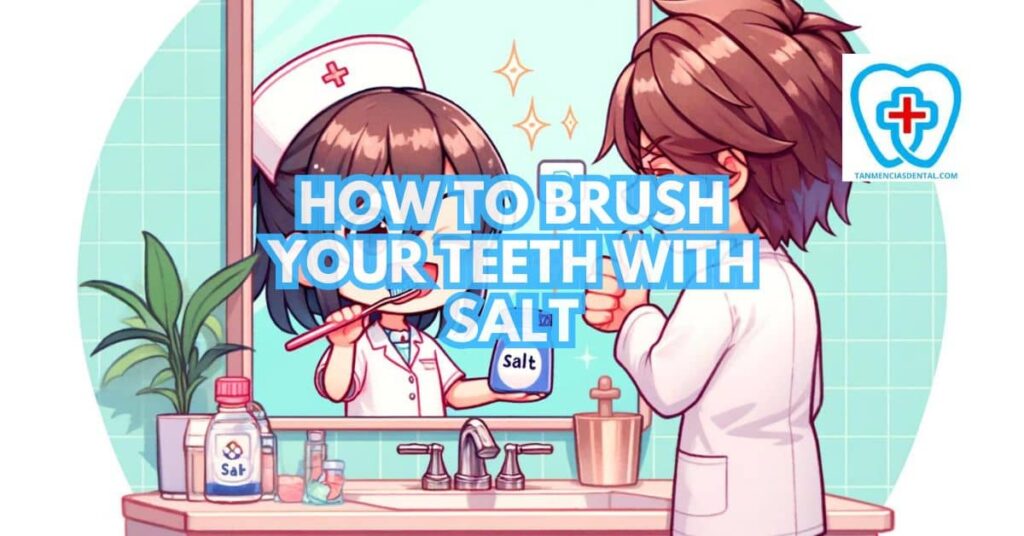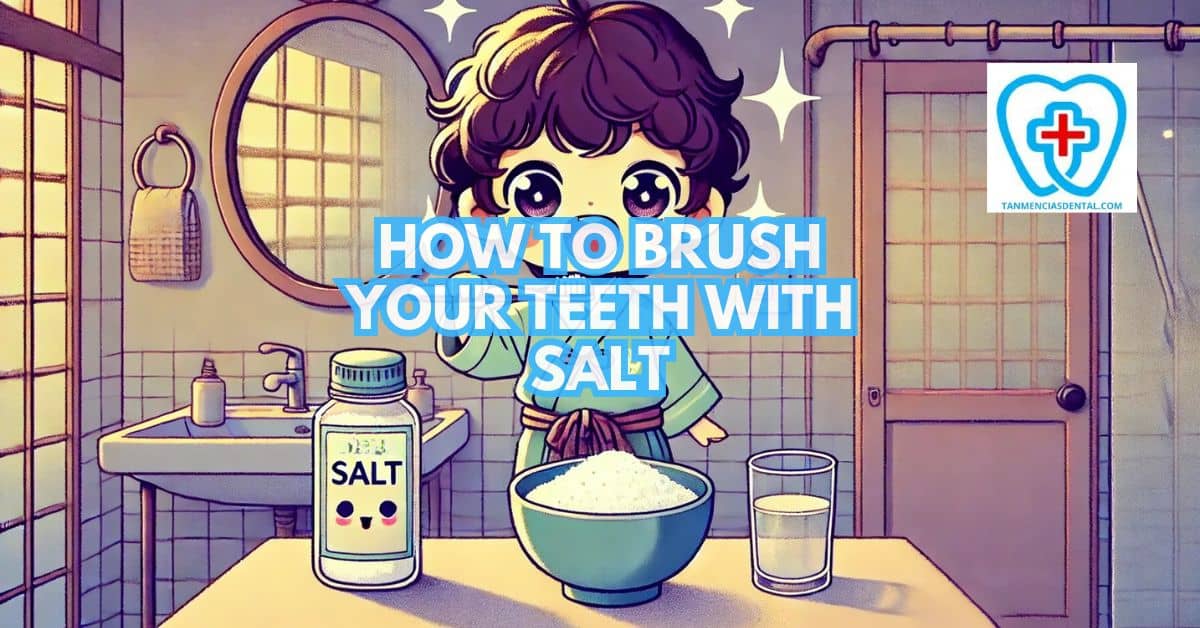Salt, a simple kitchen ingredient, can also be a natural and effective tool for oral care.
Its antibacterial properties help reduce harmful bacteria in the mouth, while its mild abrasiveness assists in removing plaque.
Learning how to brush your teeth with salt can unlock these benefits, but it’s important to use it correctly to avoid harming your enamel.
We’ll show you step-by-step how to safely use salt in your dental routine.
Discover how this natural option can contribute to a cleaner, healthier smile.
1. Gather Your Supplies
Gathering your supplies is the first important step for brushing teeth with salt.
You will need sea salt or non-iodized table salt, as iodized salt may taste too harsh and can be abrasive.
Sea salt is often preferred because it contains trace minerals that are beneficial for oral health.
Additionally, you will need water to mix the salt into a paste and a soft-bristled toothbrush to avoid damaging your gums or enamel.
A small bowl and spoon are helpful for mixing the salt and water into a smooth, easy-to-use paste.
If you prefer, you can add a bit of toothpaste to the mix for a gentler experience.
Keeping these supplies separate from kitchen items is important to avoid contamination and maintain hygiene.
🦷 Does Salt Really Whiten Teeth? Exploring Its Role in Traditional and Modern Whitening Techniques
2. DIY Salt Paste: A Gentle Recipe for Brushing
To create a gentle salt paste, mix one teaspoon of sea salt with just enough water to form a smooth, toothpaste-like consistency.
The mixture should be free of large salt granules to prevent any damage to your teeth and gums while brushing.
You can also incorporate a drop of peppermint oil for added freshness, making the paste more pleasant to use.
This DIY paste offers potential benefits like reducing bacteria in the mouth and helping to remove plaque, making it a great addition to your oral care routine.
However, since this mixture lacks fluoride, it’s important to use it alongside regular toothpaste for full protection against cavities.
Incorporating salt into your routine in moderation can provide an economical and natural way to support oral hygiene.
Just remember to use it gently to avoid wearing down enamel over time.
🦷 Effective Strategies for Treating Gingivitis in Children: Ensuring Healthy Gums for Kids
3. Technique Time: Brushing with Salt the Right Way
Apply a small amount of the salt paste to your toothbrush and gently brush your teeth using circular motions.
Focus on each tooth surface, brushing for at least two minutes to ensure thorough cleaning.
Avoid brushing too hard, as the salt can be abrasive.
Make sure to reach all areas of your mouth, including the back molars and along the gum line.
Brushing with salt should be done sparingly to complement your regular oral hygiene routine, not to replace it.
🦷 The Dangers of Untreated Cavities: Can Tooth Decay Lead to Serious Consequences?
4. Saltwater Rinse: Soothe Gums and Mouth Sores
After brushing with the salt paste, prepare a saltwater rinse by dissolving a teaspoon of salt in a cup of warm water.
Swish the solution around your mouth for about 30 seconds, then spit it out.
This rinse helps soothe irritated gums and can aid in healing minor mouth sores.
It also helps to neutralize any remaining salt taste and further reduce bacteria in your mouth.
Regular use of a saltwater rinse can complement your overall dental care by providing additional antimicrobial benefits.
🦷 Overcoming Gag Reflex While Brushing: Tips for a More Comfortable Experience

5. Brushing & Flossing: The Pillars of Healthy Smiles
Regular brushing and flossing remain the foundation of good oral health.
While salt can be a useful addition to your oral care routine, it should never replace daily brushing with fluoride toothpaste and flossing.
Ensure that you brush at least twice a day and floss once a day to remove plaque and food particles that salt brushing alone cannot.
Flossing is particularly important as it removes debris between the teeth and under the gum line, areas often missed by brushing.
Together, brushing and flossing prevent dental diseases like cavities and gum disease.
🦷 Preparing for Wisdom Teeth Surgery: Is It Okay to Brush Your Teeth Beforehand?
6. Possible Risks and Safety Tips
Using salt to brush your teeth can cause some unwanted effects if not done carefully.
Brushing too often with salt may wear down the protective layer of your teeth, making them weaker.
It can also make your gums feel sore or dry.
Some people might notice their teeth become more sensitive after using salt.
To avoid these issues, use salt brushing only a few times each week and consult your dentist if you experience any discomfort.
🦷 Caring for Your Smile with Braces: Essential Tips for Brushing and Flossing
7. Sensitive Teeth SOS: When to Avoid Salt Brushing
Individuals with sensitive teeth should be cautious when considering brushing with salt.
The abrasive nature of salt can increase tooth sensitivity and cause discomfort, especially if the enamel is worn down.
If you experience pain or sharp twinges when consuming hot, cold, sweet, or very acidic foods, it might be best to avoid salt brushing.
Always consult your dentist if you are unsure about using salt as part of your oral care routine.
They can provide personalized advice based on your dental health needs.
🦷 Post-Filling Care: Can You Brush Your Teeth Right After Getting a Filling?
8. Beyond the Brine: Salt’s Limits in Oral Hygiene
While salt is beneficial for its antibacterial and cleansing properties, it does not contain fluoride, which is essential for strengthening tooth enamel and fighting cavities.
Salt also does not provide comprehensive care for issues like tartar buildup, which requires professional cleaning to remove.
In addition, overuse of salt can lead to gum irritation and enamel erosion if not used carefully.
It is important to recognize these limitations and use salt brushing as a supplementary rather than primary oral hygiene method.
Always ensure your routine is balanced with fluoride toothpaste and regular dentist visits.
🦷 Exploring Mouth Peels After Brushing: What You Need to Know
9. Diet Doctor: How Food Impacts Your Gums
Your diet has a big impact on the health of your gums.
Foods rich in vitamins and minerals, such as dairy products, leafy greens, and nuts, can help strengthen gums and prevent gum disease.
Conversely, sugary foods and drinks can promote the growth of harmful bacteria in the mouth, leading to plaque buildup and gum disease.
A balanced diet not only supports dental health but also boosts your overall health.
Being mindful of what you eat is a key component of maintaining strong gums and teeth.
🦷 Understanding the Seriousness of Tooth Abscesses: Can They Be Life-Threatening?
10. Natural Alternatives: Exploring Safe Options
For those interested in natural oral care options beyond salt, several safe alternatives exist.
Baking soda, for example, can be used as a gentle abrasive and has natural whitening properties.
Oil pulling, an ancient practice involving swishing oil in the mouth, is touted for its detoxifying effects.
Herbal rinses made from ingredients like peppermint, clove, or chamomile can also promote gum health and freshen breath.
It’s important to research and perhaps consult with a dentist before incorporating new natural methods into your oral hygiene routine.
🦷 What Age Groups Do Pediatric Dentists Serve? A Look at Their Range of Care
11. The Dentist’s Chair: Why Regular Checkups Matter
Regular dental checkups are crucial for maintaining oral health and catching potential problems early.
A dentist can professionally clean areas of your mouth that are difficult to reach with brushing and flossing alone.
These visits also allow for early detection of issues such as cavities, gum disease, and even oral cancer.
Dentists can provide personalized advice tailored to your specific oral health needs, including guidance on the use of natural or alternative cleaning methods like salt.
Maintaining regular appointments complements your daily oral care routine and ensures long-term dental health.
🦷 Pre-Operative Guidelines: Can You Brush Your Teeth Before Surgery?
👨⚕️ Conclusion
Brushing your teeth with salt can be a beneficial practice when used correctly and in moderation.
It’s important to recognize that while salt can help maintain oral hygiene, it should not replace daily brushing with fluoride toothpaste or regular dental checkups.
Use salt as a supplementary tool in your oral care arsenal, and always balance it with traditional oral hygiene practices.
Remember to consult your dentist before making significant changes to your oral care routine, especially if you have existing dental concerns.
Embracing the benefits while recognizing the limits ensures that your dental health remains robust.
😊 Self-Promotion
Visit us at Tan-Mencias Dental Clinic, located in the heart of Parang, Marikina City, where your smile is our top priority!
Our friendly and professional team is here to provide you with top-notch dental care in a comfortable and welcoming environment.
Whether you have questions or need to schedule an appointment, feel free to call us at 9171451074, send a message through our Facebook page, or use the contact form on our website.
We’re excited to help you achieve and maintain a healthy, beautiful smile.
Reach out today—your dental health is our commitment!

